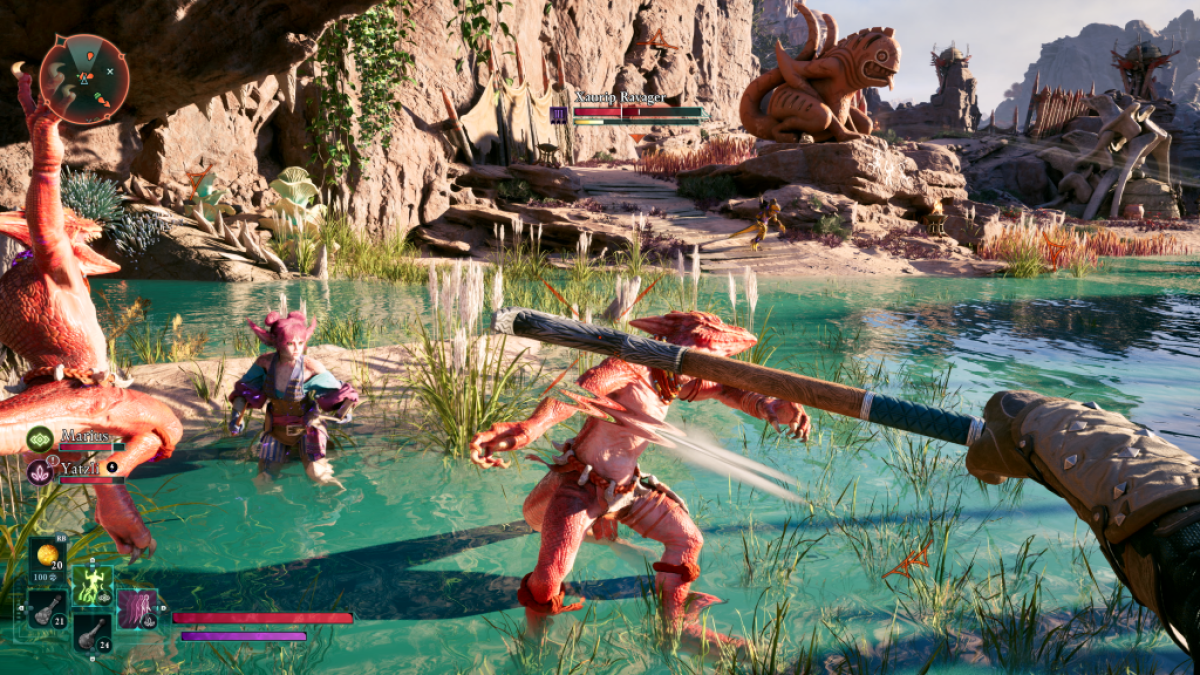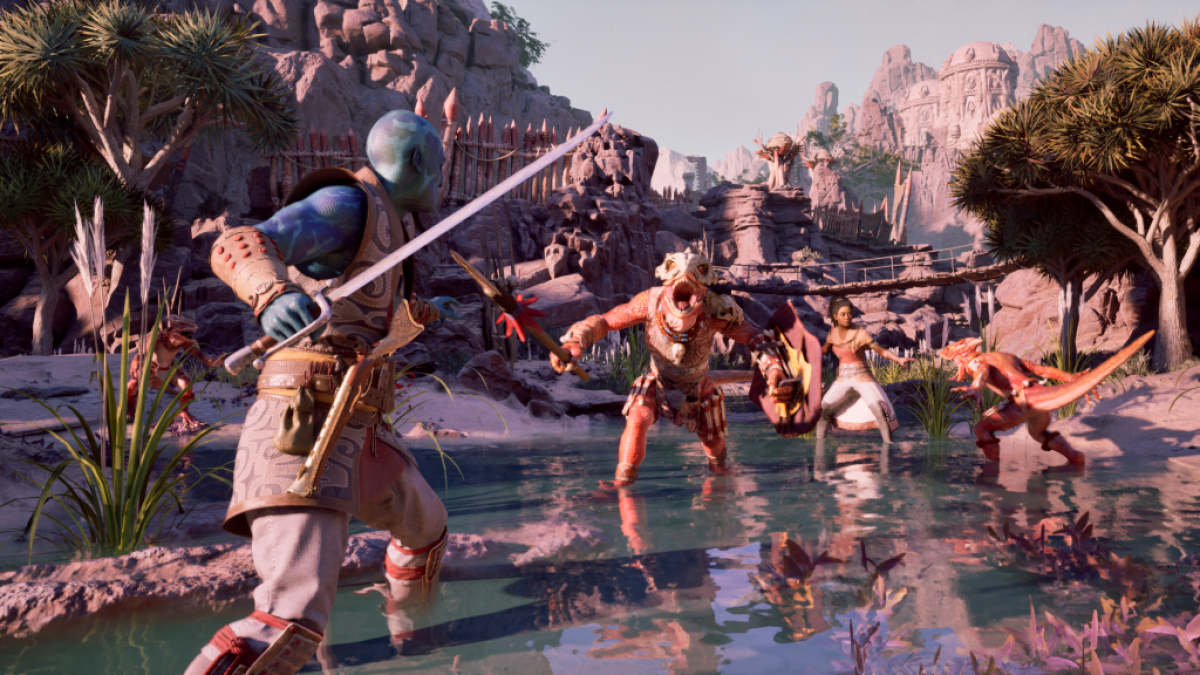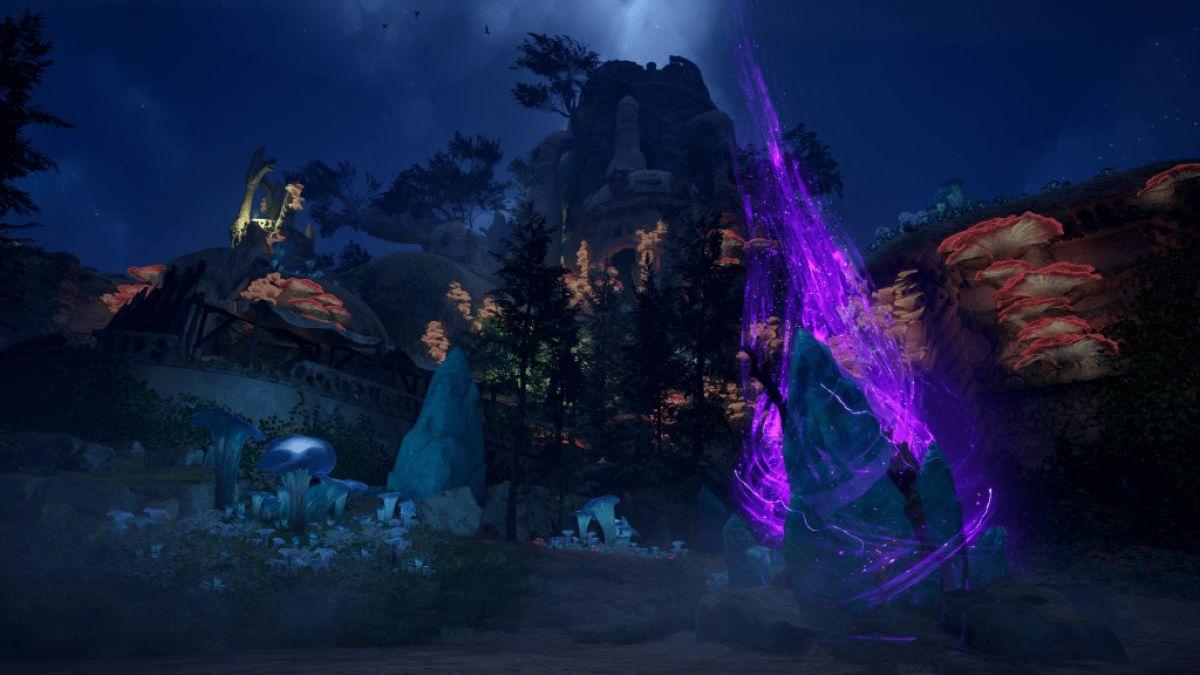As a lifelong gamer approaching my mid-twenties, I’ve never really connected with fantasy RPGs before Avowed. I’ve been waiting for one to draw me in, and with some effective trailers in the lead-up to its launch, this game did just that.
From its gunslinging combat potential to its beautiful colorful world, Avowed captured my attention early on. I’m happy to say that on full release, Obsidian delivered, and I’ve finally fallen for a fantasy RPG in spite of some flaws.
For many would-be fans, the complex worlds and systems of fantasy RPGs can be a barrier to entry. Avowed is aware of this and takes some great steps to alleviate this issue. While set in the same universe as Obsidian Entertainment’s Pillars of Eternity series, I never felt lost for not playing those games prior to Avowed.
From the early minutes of Avowed, several proper nouns from the fantasy world of Eora are going to be thrown at you. While this might be overwhelming in other games, a certain massive quality-of-fife feature circumvents this problem and creates opportunities to learn the history of the world at your own pace.
Whenever a highlighted term like the name of a Faction, God, place, or more pop up in dialogue, you’re able to press a button to instantly pause the conversation and bring up “Dialogue History & Lore.” This will give some brief context to the topic. This is incredibly helpful, and I hope it inspires more games to do the same. It’s an optional feature that never gets in the way but vastly benefits anyone looking to learn more about Obsidian’s fiction.
There’s still plenty of depth to Avowed, with all sorts of additional lore for players willing to seek it out. Avowed is full of documents players can discover to learn more about the history, lore, and cultures of the Eora. I found myself captivated by these optional discoveries for most of my first play-through because I was able to ease into the world with an optional guided hand. As I progressed through Avowed, I found myself developing familiarity and intrigue with Eora, especially the cultures and religions of its various factions. If I had needed it, however, I often had the option to ask characters about the terms they speak of in dialogue, so there’s ample opportunity for a refresher beyond hitting the Dialogue History & Lore button.
Like its history and lore, the gameplay in Avowed is also approachable with plenty of room to go deeper. After a short and sweet tutorial, you have a lot of agency as to how you discover the Living Lands. Tracking the quality of weapons and armor is straightforward, and weapon upgrades are simple in the beginning.
These upgrades start off very basic. More damage, some basic new moves in combat like a parry, etc. The abilities, attributes, and perks for Unique weapons stack way more as Avowed progresses, allowing for as much complexity and specialty in character builds as the player sees fit.

Despite how it may appear at first glance, Avowed is not an open-world RPG. The various regions of the Living Land are segmented apart from each other. The fast travel and loading screens separating these areas may not feel as immersive or “next-gen” as many contemporary RPGs. Even so, Avowed is actually a better game because of this structure. The smaller scale means each region of Avowed is highly detailed and dense. Some are also very unique, with different biomes and aesthetics showcasing the combination of Unreal Engine 5.3 and incredible art direction. All this made me wish I was playing on a high-end PC instead of an Xbox Series S to make the most of it, though it ran better than most games on the budget-friendly console.
Even with their differences, what each region in Avowed shares is a call to explore them. These areas are dense with POIs to discover, loot to find, and side quests to encounter. You can certainly populate your map and journal with side missions and bounties. However, setting off in any direction and walking for a short time is bound to bump you into something cool and compelling. Almost every time, doing so was worth it. Sometimes I found loot, others lore, or even killed a bounty and grabbed their trophy before I’d even gone to the bounty board, marking the map with the targets’ location.
Most regions in the Living Lands are dense with compelling content. Each time I entered a new region, I set aside the main quest to see what I could find. In Shatterscarp (pictured above), for example, I found myself able to stay busy and engaged for a few hours without progressing the main quest at all.

Avowed is a game about personal freedom, and this somewhat extends to combat. There are several types of weapons in Avowed, from one and two-handed melee options to firearms and spells from grimoires and wands. Experimenting with these various weapon types is an absolute blast in the early game. Getting creative with combat and discovering my own play style was one of my favorite experiences in Avowed. This is made even better by the ability to choose which weapon is in each hand, leading to some really whacky combinations that can actually be quite effective.
However, to get the most out of combat and remain effective as the game progresses, you’ll need to invest pretty heavily into a build. This becomes even more of a necessity past Normal difficulty. It takes a lot of resources to purchase or upgrade weapons and gear that will be effective in the late game. As a result, I felt stuck with one set of weapons for around half the main quest. Even still, I really enjoyed the visceral, deliberate first-person combat in Avowed.
As much as I enjoyed the combat in Avowed, though, there were times when I wished it would dial back a bit. Always having something to do means there’s never nothing to do. There were some instances when I found myself in what felt like an endless cycle of random encounters out in the Living Lands. In these rare moments, the combat began to feel like a drag as I felt forced into battles. This is especially problematic if you’re in an area with enemies you’re under-equipped to fight.
Eventually, I just learned you can run right past some of these groups of wandering enemies, but that didn’t always work. In one instance, this idea took me right into the presence of a character who most players will encounter as an early-game boss. This caused a really frustrating death and ruined the surprise of an exciting, albeit minor, story beat I should’ve encountered later. Granted, if you really need to get away, you can almost always set up a Party Camp to take a break. This is where you rest to heal, upgrade gear, and speak with your companions.
Related:Avowed PC Specs: Minimum and Recommended System Requirements

There’s an old joke that proposes that maybe, the real treasure was the friends we made along the way. In Avowed, this is kind of the truth. You’ll be quickly introduced to Kai when you first reach Dawnshore and will encounter three more characters who join your party along the quest. While all four of these companions can be found and spoken to at your Party Camp, you can only take two of them out into the world with you at a time.
The more party members I recruited, the tougher of a choice that became. Not only does one each have their own set of helpful upgradable abilities, but each has their own distinct personality and connection to the Living Lands. I found myself growing especially fond of Kai. While he’s charming from the beginning, he has a companion quest that reveals more about the life he lived before meeting the Envoy. This adds so much depth to his character and swayed me to keep him by my side for almost the entire playthrough.
Every time I switched out members of my party, I was pleasantly surprised by how well they fit into the story my decisions were shaping in Avowed. No matter who I brought with me, it felt like they were meant to be there. Each companion adds something different to every moment. I often found myself asking for their advice when it came time to make tough decisions in the branching story. I do wish, however, that these companions had more varied lines to respond to combat. Some of their quips grew tiresome the more I heard them.
Thankfully, companions bring much more to Avowed than different dialogue. Each one has a set of upgradable skills and serves a different role in combat. I was pleasantly surprised by just how capable most are in a fight. I found myself reacting to them and fighting alongside them, not just commanding them.
These companions are one of the major highlights of Avowed’s journey. Giatta and Yatzli’s magic, for example, is extremely helpful in combat. These powers also add some colorful visual flare to fights. In combat, I found myself relying on Kai as much as I sought his guidance in major story choices. However, only a few days after rolling credits, I had to remind myself of Marius’ name. His gruff personality is fun in the early game, and he has a great dynamic with Kai in the opening hours. However, I found Marius’ abilities to be quite underpowered compared to the other three for my play style. As a result, I rarely took him with me into combat and found it hard to attach to the character by the end of the Main Quest.

Ultimately, the main quest in Avowed ends up being its weakest point. You play as the Envoy, a close ally of the emperor in Aedyr. The Envoy heads to the Living Lands to investigate a mysterious plague known as the Dreamscurge, which is corrupting souls and minds across the area. Those suffering from the Dreamscurge speak in riddles and are hyper-aggressive. Folks infected with Dreamscurge also have vibrant floral growths on them. These resemble the Godlike features of the Envoy.
It’s a really fascinating premise. There’s a sense of urgency and mystery to it all, and interesting themes to boot. The Envoy represents an empire that has imposed itself upon the Living Lands, but it’s up to you how loyal they stay to Aedyr. There’s also a mysterious voice in the Envoy’s head of union origin. However, as these plots develop, they sometimes unravel.
Firstly, the voice in the Envoy’s head just grows grating after a while. It just about only speaks in riddles, making for a hard time developing any sort of relationship with the Envoy and player. The voice itself also has this really theatrical, overdramatic quality to it that gets excessive at times. Some subtlety in the performance would have been much appreciated, especially since they remain a presence throughout the majority of the main quest.
The story itself starts solid but ultimately comes a little short by the finale. No spoilers here, but it almost feels like there are too many branching narratives to guarantee any combination results in a satisfying conclusion. While some of the endings may end up feeling more powerful than others, the conclusion of my first journey felt underwhelming. Still, the taste left in my mouth at the finale was nowhere near sour enough to stop me from diving right back into Avowed for a second play-through.
While Avowed doesn’t finish nearly as strong as it starts, the game’s reasonable runtime is still worthwhile. The fantasy world of Eora is fascinating. Exploring it is deeply rewarding. The companions give the journey lots of heart. The story, even for its faults, still tells a cohesive story supported by some visuals and performances. If you can get through a few narrative lowlights and the typical RPG bugs and jank, Avowed houses an approachable but wonderful fantasy RPG worth completing and repeating.
Avowed is available on PC, Xbox Series X|S, and Xbox Game Pass from February 18th. A review code for the game was provided by the publisher. Reviewed on Xbox Series S.







